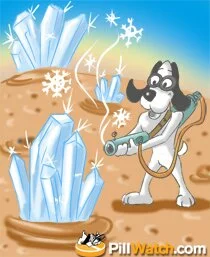
You have at least three reasons for treating your warts. First, they can be rather bothersome, especially in places that you touch often or on your feet (they can even bleed if bumped too often). Second, you may infect someone with virus, that causes wart, or even pass it to other parts of your own body (what often happens if you have warts on your hands and fingers). Of course, there is a chance, that warts disappear without any treatment, but if they won’t go away in some months, they’re better be treated. Third, it looks not very good, one thing when a child has it on his or her hand, another thing, when a wart is on a nice lady’s hand or on a face.
Treatment options for removing warts are numerous. You should only find the best way for you, and better together with your doctor’s consultation (especially in case of warts on face). All the options are given for different types of warts, some of them are harder to get rid of, some of them not – doctor will help you to identify the best suitable option for your case (this article has no information about genital warts treatment, as it is completely different!).
Over-the-counter medicines that are one of the most commonly used option in treating warts includes salicylic acid as an active ingredient. They are usually of two types:
- in form of adhesive pads (with salicylic acid)
- in form of concentrated solution of the active ingredient (or as a liquid)
- as a plaster (that comes in big peace and needs to be cut out to the size of a wart)
It takes about two months of persistent following the instruction to treat warts with salicylic acid therapy. For achieving result you need to clean the area (better after your shower), put on the acid (only to the wart) and carefully remove dead skin (especially those black dots in the center) with pumice stone. You can also just cut the wart off with a razor (after your shower), but not let it bleed, and then use an acid.
Another over-the-counter medicine contains silver nitrate. It is available on the market in form of a caustic pencil. It takes over 3-5 days to treat a wart (precise following the instruction).
Different prescription medications are also available for treating warts.
Cantharidin is a substance extracted from a blister beetle that often is effectively used in treating warts. During the time of treatment your doctor cleans the area, put on the chemical on your wart and cover it with a bandage; during the next visit (in 2 hour or one day, it depends on the solution) he or she removes the dead skin and repeat the procedure if necessary (often one procedure is all that is needed). Generally, you feel nothing, though sometimes the wart (or the blister) may hurt after applying the chemicals.
Using cold is an effective option in treating warts. This therapy is also called liquid nitrogen therapy or simply freezing, because the wart is freezed with the help of nitrogen. The procedure is also held by your doctor. He or she applies nitrogen to the wart (it is usually painless, though sometimes you can feel some discomfort) causing water in the cells to expand. Infected tissue now can be seen and removed. For the result you may need from 2 to 4 procedures (every 1-3 week).
Surgeries are other options in removing warts. This method is used when other options happened to be ineffective. You doctor can:
- cut the wart out (after numbing the area), it is often called minor surgery
- burn the wart: light electric needle is used (the anesthetic injection before the surgery is rather painfull)
- remove it using laser treatment: rather expensive, but deals with warts that are ‘stubborn in disappearing’. Intense light (laser) heats up the infected tissue causing a wart simply to vanish.
They are rather effective, although may leave scars on your skin.
This method is built up on attempting your natural immune system to deal with human papillomavirus by itself. Medications include:
- SADBE (squaric acid dibutylester)
-

- Imuquimod (special gel, often used for genital warts as well)
- Injections of interferon-alfa (right into your warts)
- Bleomycin - also injections that are shot directly into your wart. Bleomicine fights off human papillomavirus.
- Retinoids - medications that are available in oral form or as a cream, work by stopping your wart's skin cell growth. They are derived from vitamin A.
While treating your warts get ready for a period from month to 2 years to get rid of it. Follow your doctor’s directions. Remember, that for different persons different methods (and even number of the same procedure) are needed. Don’t forget about different ways of preventing warts. It is much easier to follow these instructions, than to treat a wart.
Valentyna Ant.
| Tip for you : Sign-in with Your OpenID and post faster, easier and with easy access to all your past posts. | |
|
Your Nick: |















